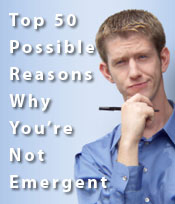
This is the third part of the book review. You can find part 1 here and part 2 here.
———————————————————————————————-
Chapter 5 – The paradoxes of our faith.
The section continued a dialog of what it means to engage a humble hermeneutic. He cites the issues of women’s suffrage and slavery as example, ones in which we now have a different opinion than 100-200 years ago. What was really strange was reading the name Daniel Henderson, the very man who baptized me, and now a pastor in Minnesota. Weird.
Tony does a good job of bringing out the slippery slope issue. He says,
“Based on his comments, he fears that humility – at least in the interpretation of the Bible – will lead to meaninglessness, to an inability to stand for something.”
He calls out the problem of certainty, which can lead to imperialism and instead offers Newbigin’s “proper confidence”. He brilliantly offers,
“While an emphasis on interpretation does preclude the many propositions about eternally “right” and “wrong” answers, it doesn’t mean that there’s not truth. Instead, it means that there are inherently better interpretations – that one interpretation can trump another.”
History clearly reveals that we have had better interpretations based on new information and dialog. The tension lies in the fact that we don’t like it when there are different interpretations than ours. Tony offers that this intellectual bravery to engage conversation and not settle is founded throughout history in Luther, Assisi, Day and Bonhoeffer.
Tony offers the idea that we can learn from any text in the library, not just the ones deemed “approved” by the church or written by Christian authors. This practice is one of the critical tensions between the traditional church and the emerging streams. To me, one is based on fear. The other is based on trust.
His dispatch #13 I would offer sums up the heart of the problem surrounding the misconceptions that Emergents don’t believe in truth. It says,
“Emergents believe that truth, like God, cannot be definitively articulated by finite human beings.”
What most people will probably hear or read or say when talking about Emergents is what amounts to an edited version of this statement; “Emergents believe that truth cannot be known by human being.” I appreciate Tony putting it into such a succinct, articulate statement.
Tony also explores a really good discussion on the nature of paradox and our desire to constantly solve the paradox. He shared his encounter with a physicist who explains that paradox is inherent to nature. An example is that a electron is both a particle AND a wave. He quotes the physicist as saying,
“I just think, if there are paradoxes in physics, then why shouldn’t there be paradoxes in theology too?”
Good food for thought for those who want to box God in. I would offer that the willingness to live in the tension of the paradox is one of the strongest traits of the emerging church.
Chapter 6 – Emergent community in the new world or “Do you trust me?”
In this chapter, Tony explores different ways emerging communities are exploring a generous orthodoxy. He profiles Tim Keel’s Jacob’s Well and shares what it’s like. He then offers an intriguing insight into how Wikipedia, an open source community of share concern can offer much to the emerging church communities. I must say that I really, really liked this idea of open source church. The concern for church heresy is mitigated by the group’s desire for truth. Messiness will occur but so will a burgeoning community. I love this section. At the heart of emerging churches is the willingness to fail and learn. We’re not afraid to grow from failure. Isn’t this real life anyway.
Tony provides a very short section on Binitarianism (the belief in the two of the three parts of the trinity). The point was that we have lost the Holy Spirit. This to me could have been a much larger section, especially in regards to interpretation. It is my sense that much of the emerging church stems from a desire to discover what the Holy Spirit is doing organically and participating where God is already working. His critique is that we do what we think works and then wonder why we’re burned out.
One of the pervasive notions of this section is the question, “Are we going to trust people?” This extends the generous orthodoxy to a generous orthopraxy, which is essentially what Jesus did when he left humanity and gave us the Holy Spirit to follow.







